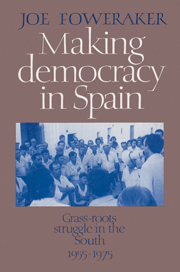Book contents
- Frontmatter
- Contents
- Preface
- Introduction: personal networks, political strategies and the making of democracy
- PART I PERSONAL NETWORKS, POLITICAL TRADITIONS AND STATE POLICIES
- PART II SYNDICAL PRACTICES, SOCIAL STRUGGLES AND POLITICAL PROTESTS
- 5 The Vertical Syndicate: the mainstay of Franco's corporatist strategy
- 6 The workers' commissions: the national picture compared with the movement in El Marco de Jerez
- 7 Wage contracts, labour conflicts and political protests: the syndical practices of the labour movement
- PART III POLITICAL PRACTICES, REPRESSION AND STRATEGIC RESPONSES
- PART IV POLITICAL STRATEGIES AND THE DEMOCRATIC PROJECT
- Bibliography
- Index
7 - Wage contracts, labour conflicts and political protests: the syndical practices of the labour movement
Published online by Cambridge University Press: 29 September 2009
- Frontmatter
- Contents
- Preface
- Introduction: personal networks, political strategies and the making of democracy
- PART I PERSONAL NETWORKS, POLITICAL TRADITIONS AND STATE POLICIES
- PART II SYNDICAL PRACTICES, SOCIAL STRUGGLES AND POLITICAL PROTESTS
- 5 The Vertical Syndicate: the mainstay of Franco's corporatist strategy
- 6 The workers' commissions: the national picture compared with the movement in El Marco de Jerez
- 7 Wage contracts, labour conflicts and political protests: the syndical practices of the labour movement
- PART III POLITICAL PRACTICES, REPRESSION AND STRATEGIC RESPONSES
- PART IV POLITICAL STRATEGIES AND THE DEMOCRATIC PROJECT
- Bibliography
- Index
Summary
They were two worlds only waiting for a sign from history to destroy each other.
Alvarez de Toledo, The StrikeDuring the times of the Republic labour and capital engaged in direct collective bargaining under the supervision of the State, and every worker carried a copy of his contract in his pocket. This contract contained the clauses which established both the wage rate and the conditions of work, and so composed the so-called bases which had been agreed between the employers' commission and the ‘workers’ commission' (comisión obrera) in the presence of the delegate of public order. These commissions sat together to negotiate on a mixed committee (jurado mixto), which had considerable power to promote agreement, but which was susceptible to political pressure. In El Marco de Jerez, for example, the working day in the vineyards had always been from sunrise to sunset, but by the end of the Popular Front government the actual working day had fallen to a mere four and a half hours. This situation was rapidly reversed with the successful insurrection of Franco, but in the years which followed, both the Falange, or the Movement which shaped the jurados within the Vertical Syndicate, and the working-class movement which spawned the workers' commissions, sought to legitimate their respective syndical practices by invoking the representative forms of the Republic.
- Type
- Chapter
- Information
- Making Democracy in SpainGrass-Roots Struggle in the South, 1955–1975, pp. 107 - 130Publisher: Cambridge University PressPrint publication year: 1989



